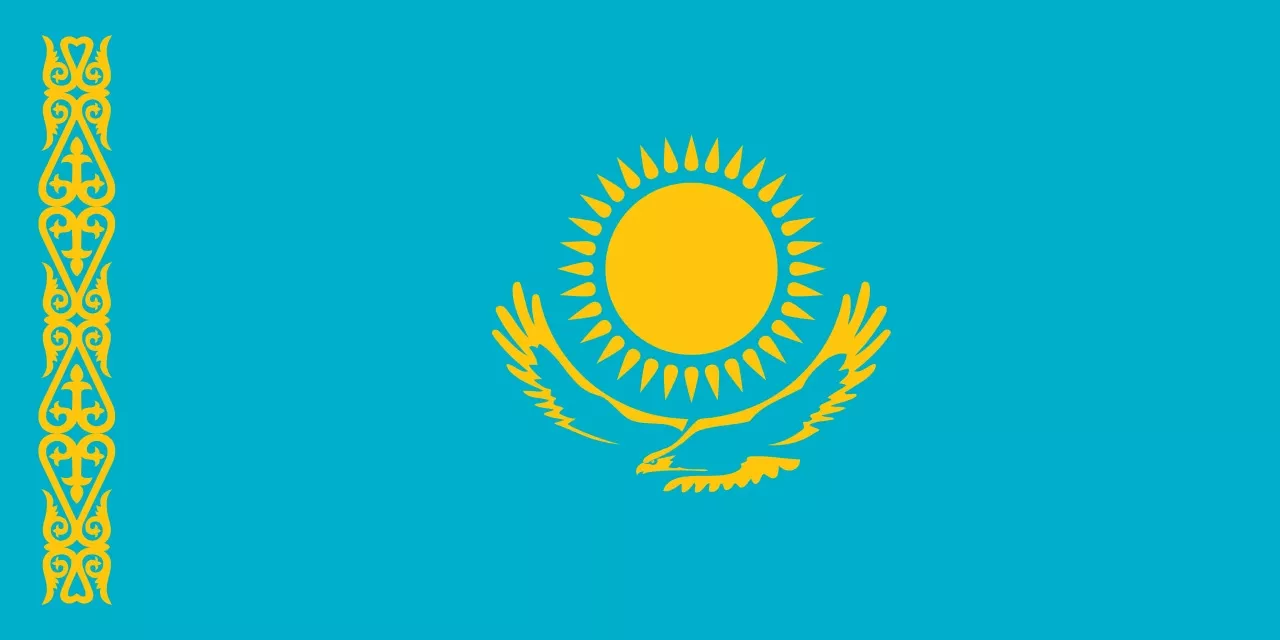

Kazakhstan
Kazakhstan is located in the middle of the Eurasian continent, bordering the Caspian Sea to the west (coastline 1,730 kilometers long), Russia to the north, China to the east, and Uzbekistan, Turkmenistan and Kyrgyzstan to the south. Kazakhstan covers an area of 2.7249 million square kilometers, ranking 9th in the world and the largest landlocked country in the world. It is about 3,000 kilometers wide from east to west and 1,700 kilometers long from north to south. There are many plains and lowlands in Kazakhstan, and the entire territory is in the transitional area from plains to mountains. 60% of the land in Kazakhstan is desert or semi-desert. The northernmost part is a plain, the central part is the Kazakh hills with a length of 1,200 kilometers from east to west, there are many lowlands in the southwest, and there are mountains in the east. The geographical center of the Eurasian subcontinent is located in Kazakhstan, and about 15% of Kazakhstan's land belongs to the European part. The capital, Astana, belongs to the 6 East time zone, which is 2 hours behind Beijing time. There is no daylight saving time in Kazakhstan. Rich in natural resources such as oil, gas and minerals, it was a must-pass for the ancient Silk Road and the first place where the Belt and Road Initiative was initiated. Since independence in 1991, Kazakhstan's political situation has been basically stable, its economy has developed rapidly, people's livelihood has been greatly improved, and its international influence has been significantly enhanced. In 2023, Kazakhstan's overall political situation will be stable, GDP will grow by 5.1%, and the inflation rate will slow to 9.8%. Kazakhstan’s central bank will lower its benchmark interest rate three times in 2023. Standard & Poor's and Fitch's outlook on Kazakhstan's sovereign credit rating is "stable", and Moody's raised the outlook on Kazakhstan's sovereign credit rating from "stable" to "positive" in October 2023. Kazakh language belongs to the Turkic language family. Kazakh and Russian are both official languages. The main ethnic group, the Kazakhs, believe in Islam and are Sunni, accounting for about 69% of the total population. Orthodox believers account for about 30% of the total population, mainly Russians.
(I) Relevant regulations on trade management:
[Import and export management system]Kazakhstan has completely liberalized the right to foreign trade, and all natural persons and legal persons can engage in foreign trade activities. Except for 11 categories of products such as weapons, ammunition, and medicines, which are restricted to import, the remaining products can be imported freely and are not subject to quotas and license restrictions. Kazakhstan implements an encouraging policy for exports. Except for 9 categories of products such as weapons and ammunition that require licenses, the remaining goods can be exported freely, but sometimes the export of certain goods, such as grain, rapeseed oil, and sugar, will be temporarily banned according to the needs of the country. In addition, for a certain period of time, the Kazakhstan government will impose export tariffs on the export of some goods, such as crude oil, certain animal furs, and scrap metals, according to changes in the international and domestic markets.
【Import tax system】On January 1, 2010, the Customs Union of Russia, Belarus and Kazakhstan was launched, and later upgraded to the Eurasian Economic Union, implementing a unified import tariff rate. Since then, Kazakhstan's import tax system has been unified under the framework of the union and levied according to the import tariff rate jointly formulated by the union. In addition, Kazakhstan only imposes export tariffs on some export commodities such as petroleum, petroleum products, scrap metals and animal fur. For details, please refer to the "Unified List of Goods for Foreign Economic Activities of the Eurasian Economic Union" approved on November 14, 2021 (www.eurasiancommission.org/ru/act/trade/catr/ett/Pages/default.aspx)
(II) Customs management regulations:
【Customs duties and fees】Customs duties and fees are uniformly formulated by the Eurasian Economic Union. In order to protect the interests of domestic production enterprises, Kazakhstan requires the unified tax rate to be aligned in stages, and has applied for a "transition period" for more than 400 commodities. In addition to the "transition period", Kazakhstan has also won a right: all imported machinery and equipment and raw and auxiliary materials used for foreign investment projects in Kazakhstan are exempt from import tariffs. Other customs duties (customs fees, etc.) are determined by the Kazakh government. Import value-added tax and consumption tax are collected by tax authorities. At present, the import value-added tax rates of the five countries of Russia, Belarus, Kazakhstan, Armenia and Kyrgyzstan are: Russia - 20%; Belarus - 20%; Kazakhstan - 12%; Armenia - 20%; Kyrgyzstan - 12%. The consumption tax rate is levied according to the existing regulations of each country based on different commodities, and whether it will be unified in the future remains to be studied. For exporting enterprises, value-added tax and consumption tax are levied first and then refunded. When importing from member countries, the importer pays the "two taxes" to the government of the country, and the exporter applies for tax refund from the government of the country based on the export documents. The taxation department has established an information exchange system to exchange goods transit and tax information monthly, and is responsible for coordinating and handling tax collection and refund matters.
【Special provisions for tax exemption】
(1) Imported goods used for humanitarian aid and charitable purposes are exempt from VAT. According to the government decree issued on December 23, 2008 (https://adilet.zan.kz/rus/docs/P080001229_#z0), from January 1, 2009, all imported goods provided by other countries, governments and international organizations for humanitarian aid and charitable purposes, including technical assistance, are exempt from VAT, except for goods subject to consumption tax.
(2) Imported goods purchased with funds provided by other countries, governments and international organizations are also exempt from VAT, and imported raw materials for the production of currency are also exempt from VAT.
(3) Imported medicines and medical supplies are exempt from VAT. Specifically including: medicines, medical (veterinary) supplies, including prosthetic and plastic supplies, deaf-mute and blind equipment and medical (veterinary) equipment, materials, equipment and supporting facilities used to produce various medical supplies.
(III) Regulations on investment industries: Kazakhstan encourages foreign investment in priority development areas, but restricts or prohibits investment in industries involving Kazakhstan's national security. Investment agreements may not be signed in the following areas:
1) Activities related to the circulation of narcotic drugs and psychotropic substances;
2) Production and (or) wholesale of goods subject to consumption tax;
3) Lottery activities;
4) Gambling business activities;
5) Activities related to the circulation of radioactive materials;
6) Banking and insurance market activities;
7) Auditing activities;
8) Professional activities in the securities market;
9) Activities in the field of digital mining;
10) Activities of credit bureaus;
11) Security activities;
12) Activities related to the trade of civilian and military weapons and ammunition;
13) Activities in the field of mineral resources, including the activities of miners;
14) Sales of minerals, including the activities of traders, sales of coal and oil. Kazakhstan particularly encourages foreign investment in non-resource areas.
In some economic fields, Kazakhstan has certain restrictions on the proportion of foreign investment. For example:
(1) Banking. Kazakhstan still has restrictive regulations on the entry of foreign banks. The capital share of foreign banks shall not exceed 25% of the total capital of all banks in the country.
(2) Insurance. Kazakhstan stipulates that the total capital share of all joint venture non-life insurance companies shall not exceed 25% of the total capital of Kazakhstan's non-life insurance market; the total capital share of joint venture life insurance companies shall not exceed 50% of the total capital of the life insurance market.
(3) Mineral investment. In 2005, Kazakhstan amended the Mineral Law, stipulating that when an enterprise is preparing to transfer mineral development rights or sell shares, the Ministry of Energy of Kazakhstan has the right to refuse to issue a license. At the same time, the state can not only give priority to purchasing the development rights or shares transferred by mineral development enterprises, but also give priority to purchasing the development rights or shares transferred by enterprises that can directly or indirectly influence the decision-making of the enterprise.
(4) Land investment. In May 2021, Kazakh President Tokayev signed the "Law on Amending and Supplementing Several Laws of the Republic of Kazakhstan on Land Relations", which completely prohibits foreigners, stateless persons, foreign legal persons, Kazakh legal persons with foreign investment, international institutions, international research centers, and non-naturalized returning immigrants from obtaining private property rights and temporary use rights of agricultural land.
(5) Financial investment. Kazakhstan's financial laws include the "Financial Leasing Law" and the "Financial Supervision Law". Legal persons engaged in financial activities must have financial qualifications. The government issues or revokes the license for natural persons and legal persons to participate in banks and stipulates the minimum amount of owned assets of banks. On July 4, 2003, Kazakhstan promulgated the "Law on State Regulation and Supervision of Financial Markets and Financial Institutions", which stipulates that the main principles of state regulation and supervision are the effective use of regulatory resources and tools, transparent supervision, and financial institutions' responsibility. The main regulatory body of Kazakhstan's banking industry is the Financial Market Regulation and Development Agency.
(IV) Special Economic Zone Regulations: [Preferential Policies for Special Economic Zones] All enterprises in special economic zones are exempt from corporate income tax, land tax, short-term (no more than 10 years) land lease fees and property tax.

Customized overseas services for Chinese enterprises
Helping Chinese companies to expand overseas with less worries
